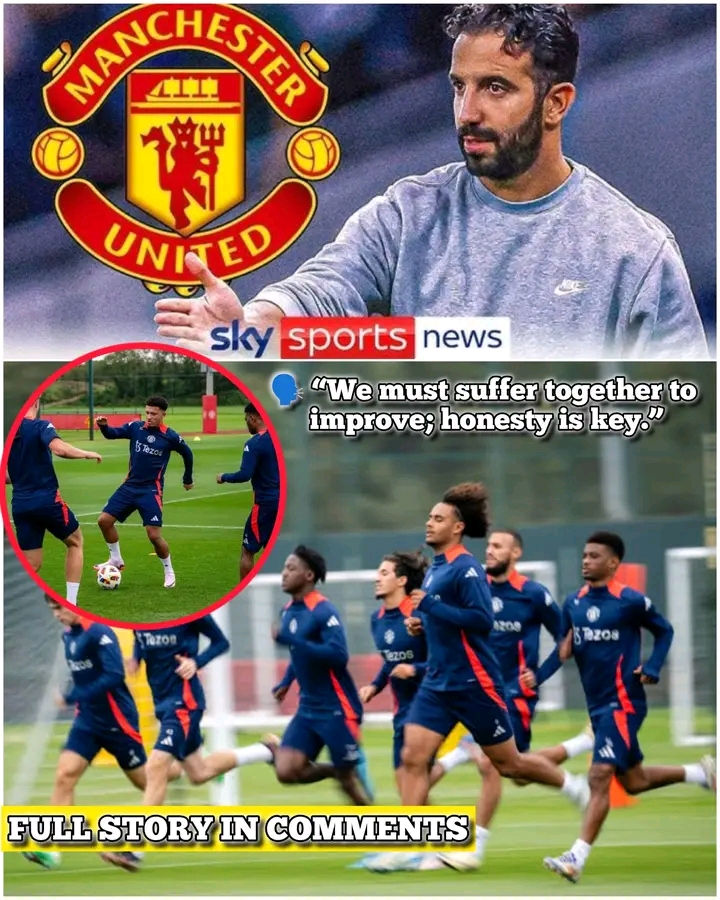Manchester United’s rebuild under Ruben Amorim has officially entered its most critical stage, and the Portuguese tactician is wasting no time setting a firm tone. Just days before pre-season kicks off on Monday, July 7, Amorim has issued a powerful warning to his squad: “We must suffer together to improve; honesty is key.” These words weren’t just motivational—they were confrontational, especially to two senior players said to be considering their future at the club.
After a catastrophic 2024/25 season that saw United crash to a humiliating 15th-place finish in the Premier League and lose the Europa League final to Tottenham, Amorim is ready to cleanse and rebuild. His message to the squad has been clear: discipline, work ethic, and team unity are non-negotiable.
Amorim’s statement comes ahead of a rigorous pre-season tour across Asia and North America, where the team’s fitness, mentality, and cohesion will be put to the test. The coach’s words ring out like a battle cry, as he urges players to embrace discomfort in pursuit of progress. “The only way forward is through struggle,” he reportedly told his coaching staff.
Appointed in November 2024 after Erik ten Hag was sacked, Amorim has struggled to implement his dynamic 3-4-3 system at Old Trafford. Injuries to key players such as Lisandro Martínez, Amad Diallo, and Diogo Dalot left gaping holes in the squad’s shape and execution. The transition was anything but smooth.
The Portuguese manager hasn’t shied away from speaking hard truths. Following a 3-1 defeat to Brighton late last season, he described his own team as “maybe the worst in the club’s history.” Though he later clarified he was referring to his own failure to make an immediate impact, the message to the players was loud and clear: standards must be raised, or changes will be made.
Already, Amorim has shown that reputation counts for little under his leadership. He made headlines by dropping Marcus Rashford and Alejandro Garnacho from the Manchester derby for reportedly failing to meet training intensity expectations. That act alone sent ripples through the dressing room—a reminder that no one is untouchable.
Inside Carrington, preparations are intense. Amorim’s 3-4-3 demands high-energy, technically gifted players with positional intelligence and physical endurance. But the current squad, still built around Ten Hag’s 4-2-3-1, lacks the speed and defensive discipline required to execute Amorim’s vision effectively.
Statistically, the drop-off has been alarming. United’s chance creation fell from 11.7 per 90 minutes under Ten Hag to 9.5 last season. Their defensive vulnerability, worsened by André Onana’s inconsistent distribution and aging centre-backs, made them one of the league’s most fragile sides. Amorim has seen enough—and wants reinforcements.
The summer transfer window will be pivotal. Amorim is reportedly eyeing Wolves attacker Matheus Cunha and Brentford’s Bryan Mbeumo as targets. But bringing them in will require sacrifices. Senior stars like Casemiro and Rashford could be sold, while Garnacho’s exit is also being considered if the right offer arrives. Amorim’s stance is brutal but strategic.
At the same time, Amorim is putting faith in youth. Kobbie Mainoo is expected to be deployed in a more advanced role, offering creativity and tempo in midfield. Academy talents such as Sekou Koné and Godwill Kukonki have also impressed in closed-door sessions and could be included in the senior squad’s pre-season tour.
Without European competitions to worry about, Amorim has approximately 40–50 matches in the 2025/26 season to embed his philosophy. The focus will be on mastering transitions, defending set-pieces, and developing a relentless physical edge that was absent last season.
His leadership style—marked by emotional intelligence and unfiltered honesty—is polarizing. Some in the dressing room appreciate his transparency; others have taken issue with his hard-hitting assessments. Yet, his former players at Sporting CP credit him for building unbreakable locker room loyalty through that same authenticity.
Off the pitch, Amorim continues to win hearts. He personally paid for club staff to attend the Europa League final and has regularly engaged fans during training sessions. That human touch adds a layer of respect to his otherwise demanding persona.
Still, pre-season won’t be easy. United face a grueling schedule of friendlies in Malaysia, the United States, and Japan. Injuries to new arrivals Matthijs de Ligt and teenager Leny Yoro have complicated preparations, but Amorim remains focused on the bigger picture.
He knows time is limited, and patience from the fans will be even more scarce. After the club’s worst league finish in over three decades, supporters want answers—and results. Amorim, to his credit, has accepted the burden of expectation, declaring: “I will not run away. We fix this, or I take full responsibility.”
His blunt approach has already caused friction. Reports of a heated exchange between Amorim and Rashford suggest tensions are simmering beneath the surface. It’s been said Amorim told Rashford: “You’re training alone or you’re gone.” A line in the sand, drawn with no room for misinterpretation.
Even so, Amorim’s man-management has been nuanced. He continues to publicly support captain Bruno Fernandes, whose future was also unclear a few months ago. “Leaders aren’t perfect,” Amorim said, “but they must lead when others fall.”
Manchester United’s future now rests on how well the squad adapts to Amorim’s intense demands and brutally honest philosophy. There is no magic fix, only time, pain, and effort. It’s a rebuild grounded in truth—and one that could either restore Old Trafford’s lost pride or end in another managerial casualty.
Whatever happens next, one thing is certain: Ruben Amorim isn’t here to play games. He’s here to make Manchester United suffer now—so they can rise later.


